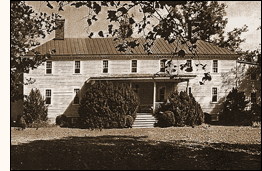
Priscilla woke
up, startled from a vivid dream. Some would even say
it was a premonition. The Civil War was raging all around
her and it was only a matter of time before the Union
army showed up on her doorstep. Priscilla Brooke Fleet
Smith had lived on this Virginia
plantation all her life, which was well steeped
in history. It had been deeded to her family by the
King of England. One couldn't turn over a rock without
coming across an Indian arrowhead or stone tool. And
Priscilla's own relative, Meriwether Lewis, just decades
before, had joined William Clark to explore the great
American West, guided by the Indian princess, Sacagawea.
After anguished
contemplation, Priscilla gave into her sixth sense and
collected all her family's portraits and valuable possessions.
"If the Union is going to burn my plantation,"
she thought, "it's not going to turn these treasures
into cinders." With that, she moved her belongings
to her daughters' houses, far away from the plantation.
It didn't hurt that those houses were made of brick,
unlike her 17th century clapboard main house, which
could easily ignite with the strike of a match.
One night, the
Union army invaded Priscilla's plantation and actually
spent the night on the grounds. Motivated by war and
destruction, they burned the outlying area to the ground,
including her daughters' brick houses containing the
family's prized possessions. Ironically, Priscilla's
main house was left untouched and still stands to this
day.
Almost one hundred
thirty years later, during our own inspection of the
main house, we made a startling discovery. With Priscilla's
premonition fresh in our minds, we examined the interior
roof of the attic space, and noticed the timbers had
been charred where the hips and rafters met the chimney.
Had a long-ago ember from the fireplace found its way
up here and began to burn, but never fully ignited?
Had Priscilla’s fear of a fire actually been legitimate?
Or had fate simply been on the side of this house, giving
it a chance to remain in light of its place in history?
Whatever the truth, we felt incredibly fortunate to
now play a small part in preserving the estate’s
extraordinary history.
|
 |